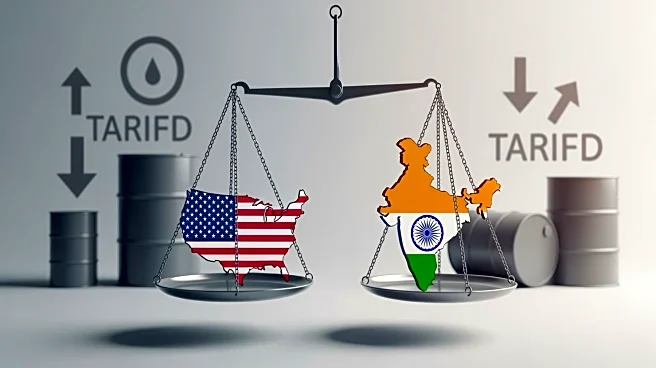What's Happening?
The United States and India are reportedly close to finalizing a trade deal that could significantly alter their economic relationship. According to reports, the U.S. is considering reducing tariffs on Indian
exports from the current 50% to between 15% and 16%. This potential agreement comes as India plans to decrease its oil purchases from Russia, a move that has been a point of contention in bilateral talks. President Trump has indicated that Indian Prime Minister Narendra Modi has assured him of this reduction in Russian oil imports, aligning with U.S. interests in the ongoing conflict involving Russia and Ukraine. The trade negotiations also include discussions on increasing India's import quota for non-genetically modified corn from the U.S., despite a 15% import duty. These developments follow a period of strained relations due to the U.S. imposing additional tariffs on Indian exports as a penalty for India's Russian oil purchases.
Why It's Important?
This potential trade agreement between the U.S. and India could have significant implications for international trade dynamics and geopolitical relations. For the U.S., reducing tariffs on Indian goods could enhance trade flows and strengthen economic ties with one of the world's largest markets. For India, the reduction in tariffs could boost its export competitiveness in the U.S. market. Additionally, India's commitment to reducing Russian oil imports aligns with U.S. foreign policy objectives, potentially easing tensions between the two nations. The deal could also set a precedent for how countries navigate trade relationships amid geopolitical conflicts, particularly those involving energy resources. Stakeholders in both countries, including businesses and consumers, stand to benefit from improved trade terms and potentially lower costs.
What's Next?
As the U.S. and India move closer to finalizing this trade deal, both countries are likely to continue negotiations to address remaining issues, such as market access and tariff mechanisms. The outcome of these talks could influence future trade policies and economic strategies. Political leaders and industry stakeholders will be closely monitoring the situation, as the agreement could impact various sectors, including agriculture, energy, and manufacturing. The international community will also be watching to see how this deal affects global trade patterns and geopolitical alliances.










